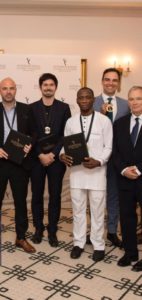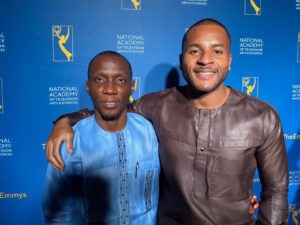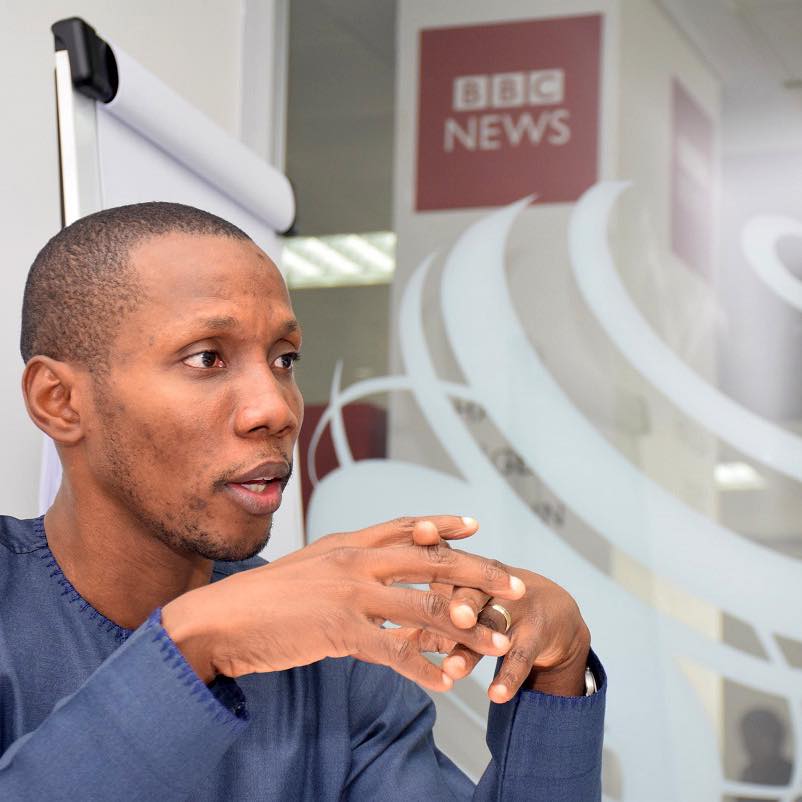Adejuwon Soyinka, a 2019 Emmy Awards nominee, is Regional Editor (West Africa) The Conversation Africa. Before his present appointment, he was Editor/Head, BBC Pidgin Service at BBC World Service, Senior Special Assistant (Media) to the Ogun State Governor, Deputy General Editor, TELL and Editor, www.tell.ng at Tell Magazine.
In this online interview with Lekan Otufodunrin, Soyinka shares his experiences and offers advice for journalists seeking to enhance their careers and take advantage of local and international opportunities.
It’s already three months plus that you joined The Conversation Africa as the Regional Editor, WA. How has work been? How is it different from what you used to do at BBC and other media organizations you have worked?
Work has been quite interesting and full of learning. One of my experience over the years has been that new roles often present new challenges and new challenges are in themselves opportunities to learn new skills and further develop yourself as a professional. This has been my story since I joined The Conversation media group as West Africa Regional Editor. As far as management of human and material resources across national boundaries in West Africa is concerned, I would not say there has been much of a difference between what I used to do as Editor and Head of the BBC Pidgin Service and what I currently do.
In both cases, I worked with a team that has a presence not only in Nigeria but also in other countries within West Africa. There has also not been much of a difference in terms of working in an international news organisation with operations in different parts of the world. This means learning and appreciating cultural diversities.
In the area of journalism, I would say working at The Conversation has further broadened my perspective. This is in the sense that at The Conversation, we deal more with academics. To be qualified to write for The Conversation, you need to have a minimum of a PhD and affiliated with a university or research institution. Therefore, the journalism here is quite elevated.
As an independent source of news and views from the global academic and research community, our editors at The Conversation, work with experts to unlock their knowledge and promote a better understanding of current affairs and complex issues by the wider public and policymakers. We believe that access to such independent, high quality, explanatory journalism is very critical for the sustenance of democracy and promotion of quality public discourse.
Your decision to move on from BBC came as a surprise considering the award-wining productions you led and other accomplishments. What were your considerations for leaving?
First, I like to thank you for your kind words and appreciation of the modest achievements we recorded while at the BBC Pidgin Service. I say “we” because it was not a one-man show. It was teamwork and I am grateful for the opportunity to work with such a fantastic team at the BBC Pidgin Service. Indeed, I had the privilege of leading a team of young, talented journalists to produce many original stories that created great impact both locally and internationally.
A testament to this is the fact that content produced by the BBC News Pidgin Service were severally referenced by other international media organisations like Independent UK, New York Times, the Washington Post and several other national publications in Nigeria, Ghana and Cameroon to mention just a few.
Some of the exclusive content produced by the BBC Pidgin team include, “Sweet, sweet codeine,” and “Sex for Grades,” both of which are investigative journalism documentaries that led to major policy changes not only in Nigeria but also across the continent. Our excellent journalism did not also go unnoticed as it brought some well-deserved accolades from within and outside the BBC.
READ ALSO: My experience working in six foreign media houses- Fidelis Mba

Some of these include getting the first-ever International Emmy awards nomination, in the current affairs category, for the BBC World Service and Nigeria. Apart from the Emmys, the team under my leadership also won the One World Media Awards in the Best TV Documentary category, 2019, BBC Digital Award, 2018 and BBC Media Awards, Best use of Social Media (2018).
We were equally finalist in the Investigation of the Year category at the Association for International Broadcasting Awards, AIB, 2018, a finalist in the Best Documentary category, Royal Television Society, RTS Awards, 2018 and finalist for the Global Investigation of the Year category at the British Journalism Awards, 2018.
Having achieved all that, anyone who knows me quite well would also know that I am the type that works with set tasks, deliverables and personal targets. I believe that having surpassed both institutional and personal set targets at the BBC Pidgin Service, the time was ripe for me to seek newer challenges, which would then present opportunities to acquire newer skills and further develop myself as a professional and that is exactly what I did.
What will you consider as the major highlights of your work at the BBC and the professional lessons you learnt?
Speaking of highlights, first I would like to mention the privilege of leading the brilliant team at the BBC Pidgin Service to birth a major news outlet in Pidgin language, the first of its kind in the 97-year-old history of the BBC. Those people are some of the best in the industry.
The other major highlight of my work at the BBC, I would say, was the production of those two investigative documentaries: “Sweet, sweet codeine” and “Sex for Grades.” I found those two interesting because they drew from my previous experience and skills as a multiple award-winning investigative journalists right from my days at TELL magazine, Nigeria’s number one investigative news magazine.

Looking back at those two productions, their success and impact highlighted the importance of teamwork and team spirit, which is a major professional lesson I would say I learnt from the BBC. We could not have achieved the kind of result we got without the support of our colleagues in the BBC Africa Eye team as well as colleagues in other departments of the BBC, including the digital team, editorial policy, legal, publicity, business development and a host of other colleagues.
The BBC is a great place to learn the value of diversity, team spirit and creativity and these are some of the many professional lessons I learnt from the organisation.
How will you compare your work experience in Nigeria media and the international organizations like BBC and now CA in terms of facilities, welfare and other considerations?
In terms of facilities, welfare and other considerations, there is a wide gulf between Nigerian media and International media outfits like The Conversation or the BBC. I believe that what makes the difference is the level of investment that goes into these organisations.
Although in a way, one might say that it may be an unfair comparison to place The Conversation or the BBC side by side with any local media in Nigeria in the sense that their business model and financing is completely different. Whereas the two international news media I have worked with are not-for-profit outfits, many Nigerian local media organisations are commercial outfits whose survival depend strictly on the vagaries of demand and supply market forces.
In that sense, their very existence can be threatened or determined through government policies or as we have seen in some cases, a conspiracy between the political and business elites of the society.
What are the basic requirements to be employed in international media organizations based on your experience?
I would say education, skills and experience. The requirements are not much different from what is obtainable in other newsrooms, locally. It is just that you need to carefully study the job description and required skill set and be sure that you have them before bothering to apply for the role. I must also say that colleagues need to understand that the era where it was sufficient to have just one skill as a journalist is over. Today’s journalist is expected to have multi-media skills.
What is your advice for journalists seeking to enhance their career and taking advantage of global opportunities?
Acquire multi-media skills and if possible, learn a second international language apart from English. Then actively seek out such international opportunities. Go online and search for them.
In some cases, you may need to register your profile on some platforms so that whenever opportunities are matching your skills and experience, you get an automated invitation to apply for such roles. For instance, I know you can do that on the Jobs board of The Conversation Africa website and you can do that on the BBC Careers website.
You were a media adviser to a former governor. How easy was it to function in that capacity and what is your advice for journalists still seeking such position?
My first advice for those seeking such roles is to stop and desist from seeking the role. Do not seek such a role rather let the role seek you. As a journalist, if you are not an active politician who participated in the campaigns and actively contributed to the emergence of the principal, then the only other way that I believe you can be respected on the job as a professional is if the role sought you out and not you going to beg for the role.
Having said that, I will say that I enjoyed working with my Principal, Senator Ibikunle Amosun. It was tough working with him because he is a hardworking governor, who was and is still very passionate about the development of Ogun State and the welfare of the people. So much is his passion for the state that as governor, he always worked round the clock. Of course, the result of such efforts today stands in testimony to his credit in the form of infrastructural developments in different parts of Ogun State.
What is your general assessment of the media in Nigeria and what are your suggestions for improvement, especially considering the digital disruption of the industry?
I think the Nigerian media is doing its utmost best in the circumstance in which it has found itself. From my experience across the continent and beyond, I can say that the Nigerian media is one of the most vibrant.
This country has produced some of the best brains in the field of journalism and media practice in the world. Even when we speak of the digital age, the Nigerian journalist is not particularly lagging. We have one of the most vibrant digital media space on the continent as well. Therefore, the workforce is not an issue. The problem, in my view, is a lack of proper capitalisation of many of our local media organisations and the absence, in some instances, of the proper governance structure.
Any other information you think will be helpful to journalists in their career?
My advice to people aspiring to be a journalist is to be sure, of exactly why they want to be a journalist. You need to have a personal mission and set goals before you venture into the profession.
You will then find that your mission and set goals would become your anchor when the going gets tough as they would sometimes on this job. In addition to that, as journalists, we need to constantly innovate and evolve. We must be willing and ready to acquire new skills as that is the only way to ensure our continued relevance in this profession.


Beautiful dialogue here.
Incisive! Thumbs up for both the medium and my brother, Juwon, the interviewee.